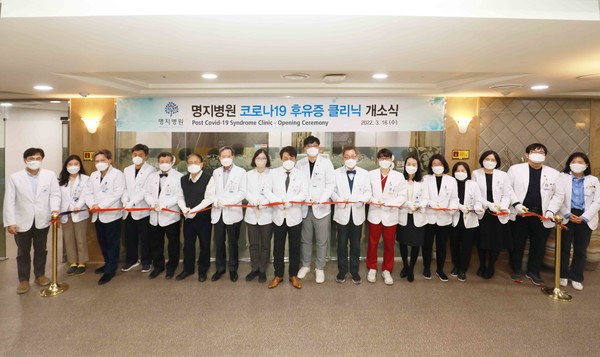As the cumulative caseload of Covid-19 exceeds 7 million in Korea, Myongji Hospital has opened the “Long Covid Clinic,” which will treat patients cured of Covid-19 but suffer from its aftereffects.
The clinic, the first such one responsible for long covid, will treat various aftereffects Covid-19 patients suffer after recovery, the hospital said.

Some cured Covid-19 patients suffer from a wide variety of aftereffects, such as respiratory symptoms, including coughing, phlegm, and difficulty breathing, neurological symptoms, including headache, dizziness and sleep disorder, constitutional symptoms, including chronic fatigue and listlessness, and mental and psychological disorders, including decreased memory, lack of concentration, and depression.
According to the hospital, some also experience olfactory and palate problems, keratoconjunctivitis, hair loss, menstrual irregularity, and sexual dysfunction.
The hospital’s long covid clinic will treat patients in a multidisciplinary treatment system where the respiratory, neurological, and family medicine departments play a central role, supported by cardiology, nephrology, psychopathology, otorhinolaryngology, ophthalmology, dermatology, ob-gyn, urology, rehabilitation, pediatric-adolescent, and infectious departments.
The participating departments have prepared integrated protocol and screening systems based on data on out-patients suffering from aftereffects and clinical data at home and abroad. Besides, they will find appropriate treatment methods by comprehensively handling aftereffects and tracing and observing them through inter-disciplinary treatment and additional examination.
In parallel with the treatment of aftereffects through medical diagnosis and treatment, the clinic will also carry out psychological recovery programs by, for instance, artistic treatment, if necessary, the hospital said.
“If specific symptoms continue for a month after recovery from Covid-19, you should regard it as long covid,” said Ha Eun-hye, a professor of respiratory medicine and head of the newly opened clinic. “Depending on symptoms, we should examine and observe patients through blood tests, lung function tests, X-rays, and CT. In addition, more specialized checks and diagnoses are needed to prepare for various other aftereffects.”
Myongji Hospital Chairman Lee Wang-jun said, “Some reports say up to 87 percent of Covid-19 patients experience aftereffects at least once even after a year of recovery. That shows the need for a system to treat long covid, which will inevitably come in the post-coronavirus era.”
Lee added that the hospital had come to establish an interdisciplinary treatment system of long covid with the participation of 15 departments to reveal unidentifiable causes and provide effective treatments.

